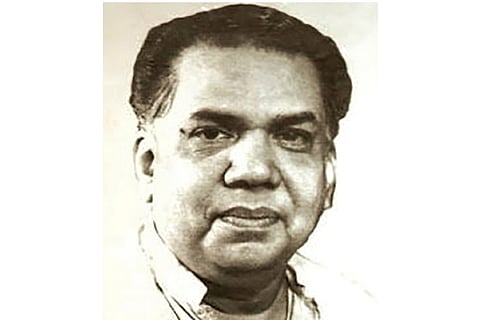

Chennai
A host of people fought for the freedom of the nation of which some are remembered. Most, however, have faded from the memories of mortal minds. Even spectacular deeds and happenings have gone unremembered though well-documented in those times.
The British cultivated the Nagarathar community. Even rewrote laws in Burma and the far east to suit their business. Nagarathar capital provided the thrust for colonisation of east Asia. It was quite surprising that a community which was pro-British predominantly threw up great freedom fighters. Chinna Annamalai was foremost amongst them.
Expelled from the Devakottai NSMVPS school for instigating a strike to close it down for a day to mourn the death of Kamala Nehru, he was unable to write his school-leaving final exams. Afraid that their son might continue the anti-government activity, Annamalai was sent to Malaya by his parents.
There, as a teenager, he organised estate workwomen to fight against liquor shops on which their husbands were flittering away their wages. This ended up in arson with a few liquor shops being burnt. Hauled before the Penang magistrate, he was put on a boat back to India but not before a few interesting exchanges on non-violence and freedom with the magistrate. Decades later, the retired magistrate and his wife were in Madras on a holiday and spotted by Annamalai in Elliot’s Beach. The reunion was joyous, regardless of previous circumstances and Annamalai took them on guided tours of Mahabalipuram and Madras.
Back home, Annamalai jumped back into freedom struggle in the late thirties. He was impressed with the writings of Kalki whom he had never met. However, he borrowed liberally from Kalki’s writings in Ananda Vikatan for his stage speeches. Soon he was a much sought-after speaker to hold the crowd strength.
When there was a chance to speak before Rajaji, Annamalai would mug up an entire article of Kalki on the leader and repeat it eloquently on stage. Embarrassingly, the chief guest recognised the origins of the speech. Fortunately for Annamalai, Kalki, whom he had never seen before would be on the stage that day. This awkward sequence, however, led to a lifelong friendship for Annamalai. Rajaji would later defend Annamalai in a sedition and jailbreak case. Kalki would encourage Annamalai to seek publishing as a career with even his own historical novels being published by Annamalai’s Tamil Pannai.
Annamalai was chosen by Gandhi to be the individual satyagrahi for Devakottai. It was Gandhi’s plan in 1941 for one volunteer per town to speak against the British government involving India in the world war and court arrest. But the British had cleverly decided to ignore the satyagrahi and not give him any attention by arresting him. Annamalai was not arrested and walked 300 miles all the way to Madras courting arrest in every habitation on the way. He was arrested in Chintadripet.
But his golden hour was to come in Quit India movement which ironically his guru Rajaji called as hooliganism and asked patriotic people to boycott. During the Quit India movement of 1942, the British police had Annamalai arrested in the middle of the night and transported him by a private bus to Thiruvadanai jail. Hearing the news, the furious crowd of Devakottai burnt the bus and the court where he was to be produced the next day.
As it dawned, they marched in several thousand-strong crowds, determined to break the jail where Annamalai was held. The outnumbered police were stunned and Annamalai was released by the crowd. In a subsequent police firing, several people were killed and maimed. In the Madras Presidency, very few cases of anti-government rioting were held because of lack of political leadership. But what happened to Chinna Annamalai was a rare and notable event. The rearrested Chinna Annamalai faced a jail term of six years and was defended by Rajaji in court who fought for and reduced the term to six months.
On his release, Annamalai would migrate to Madras on Rajaji’s advice and set up a publishing unit called Tamil Pannai (the Tamil farm) near Panagal Park. He published books including historical novels of Kalki amongst others. Every book was released with a gala function to honour the writer. Though he made very little money on it, Annamalai would inspire a host of people to start publishing units in Madras. The wooden stools in the veranda of the publishing firm used to be a big discussion spot for the top political and literary figures of Madras in the evenings.
Tamil Pannai was not without action. Publishing a book on the Bengal famine the publisher would serve a jail term. Annamalai never lacked ambition. He wanted to publish Gandhi’s Harijan paper in Tamil and negotiated it with the Mahatma himself on his 1946 visit. When Gandhi queried, “Can you run it without a loss?” Rajaji, who was nearby, said, “Like you, he too is born in a businessman community.” Annamalai would later start the Shivaji Ganesan Fans Association to unite the Congressmen disillusioned by the Dravidian victory. While many freedom fighters opted for politics and governance, which helped keep their memories alive, Annamalai chose to spend time in publishing and cinema and his memorable freedom fighting deeds were overlooked by history books, unfortunately.
—The author is a historian
Visit news.dtnext.in to explore our interactive epaper!
Download the DT Next app for more exciting features!
Click here for iOS
Click here for Android